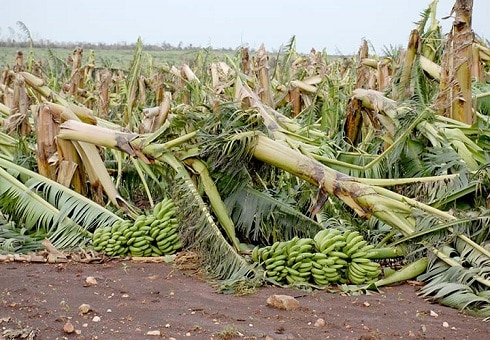Tranquility: Rice producers say that there is enough grain in storage to supply the national demand, therefore, they confirm that there will be no shortage.

 Santo Domingo, Dominican Republic, September 2017 (IICA). Global warming continues to raise ocean temperatures which intensifies the formation and intensity of extreme events such as hurricanes. In light of this scenario, and due to its location in the Caribbean, the Dominican Republic has increased its exposure to such events, which are influenced by climate change. In September alone, the country has been heavily affected by hurricanes Irma and Maria, two meteorological events which have practically devastated agriculture and caused serious damages to livestock.
Santo Domingo, Dominican Republic, September 2017 (IICA). Global warming continues to raise ocean temperatures which intensifies the formation and intensity of extreme events such as hurricanes. In light of this scenario, and due to its location in the Caribbean, the Dominican Republic has increased its exposure to such events, which are influenced by climate change. In September alone, the country has been heavily affected by hurricanes Irma and Maria, two meteorological events which have practically devastated agriculture and caused serious damages to livestock.
The most affected regions by both hurricanes were the eastern, north, northeast and northwest regions, including the two most important basins for the agricultural field, the Yaque del Norte and Yuna rivers (and their tributaries). These basins are still flooded and have a high rainfall rate, which exacerbates the isolation of large numbers of agricultural regions, and complicates the timely data collection for damages quantification caused by these meteorological events to the agricultural sector by the relevant official institutions, namely the Ministry of Agriculture.

 Although there are no official numbers for the quantification of damages caused by Irma and Maria, several institutions, associations and agribusiness leaders of the country have been making preliminary notifications about their appreciation for losses in the respective crops they manage; numbers that, although they will be revised and adjusted in the near future by official information, still reflect the severity of the impact left by the effects of these two hurricanes on Dominican territory.
Although there are no official numbers for the quantification of damages caused by Irma and Maria, several institutions, associations and agribusiness leaders of the country have been making preliminary notifications about their appreciation for losses in the respective crops they manage; numbers that, although they will be revised and adjusted in the near future by official information, still reflect the severity of the impact left by the effects of these two hurricanes on Dominican territory.
For example, in the rice sector the preliminary numbers estimate heavy losses due to the flooding of about 7,500 ha of land planted with rice, which affected about 10,000 farmers. However, according to the opinion of this sector, there will be no shortage of cereal in the country in the near future, because there is sufficient reserve of grain in storage.
In the banana sector, an estimated 5,351 ha were impacted by Hurricane Maria, not including losses due to damage to irrigation canals, irrigation pumps, power plants; among other equipment. No quantifications or estimates have yet been made with details in other agricultural products.
It is estimated that the immediate consequences of both hurricanes in the agricultural sector will include:
- The interruption of the production cycle of the main crops of economic importance in the country (bananas, rice, fruits and vegetables, among others), mainly in the agricultural regions of the east, north, northeast and northwest from the country. Irrespective of the direct damage caused by winds to crops such as bananas and bananas, most of the soils in the production regions of these crops suffered serious flooding, further exacerbating the possibility of marketing finished agricultural products the difficulty of access or the damage to the roads, roads and bridges.
- The immediate loss of marketing, leading to non-compliance with the commitments made by the agricultural sector of the affected areas in the local market and in the main export markets of the country.
- Potential non-compliance with payment commitments entered into with credit institutions, which will have to review the payment schedules established with the affected productive sectors.
- The almost immediate increase in the costs of agricultural products for the consumer in the markets, due to the lack of supply as a result of direct damages to agricultural items and, in other cases, the difficulty of access to the areas of production.
- In the livestock field, substantial damage has also been reported, mainly in the Eastern Region, not only due to the direct death of animals (pig production) but also the destruction of infrastructure such as stables and milking facilities, problems in the marketing of milk produced in flooded areas and damage to perimeter fences in operating units; situation that will later bring consequences with the potential increase of pests and diseases.
From now on, it is expected that the Ministry of Agriculture and other entities in the agricultural sector will initiate the dissemination of various measures to be taken by both the agricultural and the livestock sector to proceed to the immediate recovery of both sectors, and to control a potential pests and diseases outbreak that normally occurs after the occurrence of this type of meteorological event. In this context, IICA reaffirms its willingness to support the authorities in the recovery efforts to promote agricultural development in the Dominican Republic.
More information: hector.perez@iica.int
dileccio.vanderlinder@iica.int











